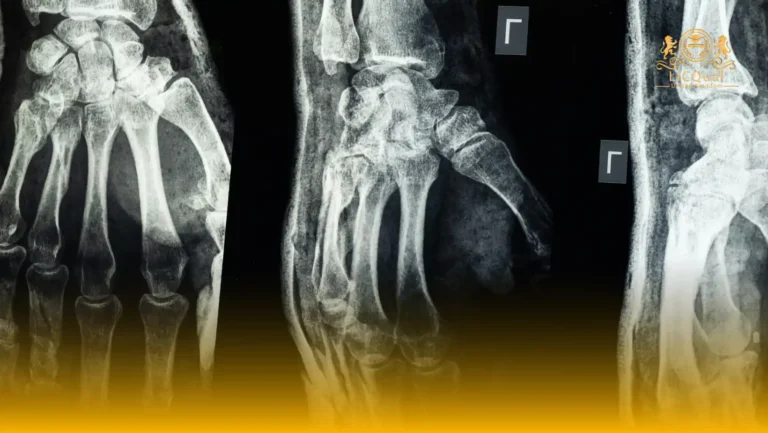The LICQual Level 3 Certificate in Nutrition and Metabolic Health (Cert Metabolic Health) is a specialised qualification designed for professionals seeking to deepen their understanding of nutrition and its impact on metabolic health. This course equips learners with the knowledge and skills to assess, monitor, and optimise metabolic processes through evidence-based dietary and lifestyle strategies.
This qualification is ideal for healthcare professionals, nutritionists, dietitians, wellness practitioners, and allied health professionals who wish to enhance their career prospects, broaden their knowledge, and engage in Continuing Professional Development (CPD). Learners will explore key topics such as energy metabolism, hormonal regulation, metabolic disorders, and the role of nutrition in the prevention and management of chronic diseases.
Centres delivering the LICQual Level 3 Certificate in Nutrition and Metabolic Health are required to maintain the highest standards of training. Learners benefit from competent and qualified staff, access to comprehensive learning materials, and all necessary resources to ensure a high-quality learning experience. The programme blends theoretical knowledge with practical applications, enabling learners to confidently implement nutritional strategies that support metabolic health in professional practice.
By completing this course, learners will develop a strong foundation in metabolic science, nutrition assessment, and professional practice, allowing them to make informed, evidence-based decisions. This qualification represents a significant step forward for professionals seeking to integrate scientific knowledge with practical skills in nutrition, metabolic health, and overall wellbeing.
Course Overview
Qualification Title
LICQual Level 3 Certificate in Nutrition and Metabolic Health (Cert Metabolic Health)
Total Units
6
Total Credits
24
GLH
120
Qualification #
LICQ2201023
Qualification Specification
To enroll in the LICQual Level 3 Certificate in Nutrition and Metabolic Health (Cert Metabolic Health) , applicants must meet the following criteria:
|
Qualification# |
Unit Title |
Credits |
GLH |
|---|---|---|---|
|
LICQ2201023-1 |
Principles of Metabolic Health |
4 |
20 |
|
LICQ2201023-2 |
Macronutrients and Micronutrients in Metabolic Function |
4 |
20 |
|
LICQ2201023-3 |
Metabolic Disorders and Nutrition |
4 |
20 |
|
LICQ2201023-4 |
Nutritional Assessment and Intervention |
4 |
20 |
|
LICQ2201023-5 |
Research Methods and Evidence-Based Practice |
4 |
20 |
|
LICQ2201023-6 |
Professional Practice, Ethics, and CPD |
4 |
20 |
By the end of this course, learners will be able to:
Unit 1: Principles of Metabolic Health
By the end of this unit, learners will be able to:
- Explain the fundamental principles of metabolism and energy balance
- Analyse physiological processes that influence metabolic health
- Evaluate the role of nutrition in maintaining metabolic homeostasis
- Identify factors that affect metabolic efficiency and overall health
Unit 2: Macronutrients and Micronutrients in Metabolic Function
By the end of this unit, learners will be able to:
- Explain the functions and requirements of macronutrients and micronutrients in metabolic processes
- Analyse the impact of nutrient intake on energy production, storage, and utilisation
- Evaluate how nutrient imbalances can affect metabolic health
- Apply knowledge of nutrients to support dietary planning and intervention strategies
Unit 3: Metabolic Disorders and Nutrition
By the end of this unit, learners will be able to:
- Identify common metabolic disorders, including obesity, diabetes, and metabolic syndrome
- Analyse the relationship between diet, lifestyle, and metabolic disorders
- Develop evidence-based nutritional strategies for prevention and management of metabolic conditions
- Evaluate the effectiveness of interventions in improving metabolic health outcomes
Unit 4: Nutritional Assessment and Intervention
By the end of this unit, learners will be able to:
- Conduct assessments of metabolic health using anthropometric, biochemical, and dietary methods
- Analyse assessment data to identify nutritional risks and requirements
- Develop and implement personalised nutrition interventions to support metabolic health
- Monitor and evaluate the outcomes of nutritional interventions
Unit 5: Research Methods and Evidence-Based Practice
By the end of this unit, learners will be able to:
- Demonstrate understanding of research methodologies relevant to nutrition and metabolic health
- Critically appraise scientific literature and apply findings to practice
- Apply evidence-based approaches to develop effective nutritional strategies
- Design research-informed recommendations to support metabolic health improvement
Unit 6: Professional Practice, Ethics, and CPD
By the end of this unit, learners will be able to:
- Demonstrate professional and ethical conduct in nutritional practice
- Apply relevant legal, regulatory, and ethical frameworks in professional settings
- Identify opportunities for Continuing Professional Development (CPD) to enhance competence
- Reflect on professional practice to improve service delivery and outcomes in metabolic health
The LICQual Level 3 Certificate in Nutrition and Metabolic Health (Cert Metabolic Health) is ideal for anyone looking to enhance their understanding of nutrition, metabolism, and wellness. This course is suitable for aspiring health professionals, fitness enthusiasts, and individuals who want to apply evidence-based nutrition strategies in their careers or personal lives. Whether you are starting your journey in nutrition or seeking to upskill, this program provides practical knowledge and professional credibility.
1. Aspiring Nutrition Professionals
- Gain foundational knowledge in nutrition science and metabolic health
- Understand diet planning and assessment strategies
- Learn about clinical nutrition practices
- Develop skills to design personalized nutrition programs
- Prepare for advanced nutrition certifications
- Build credibility in the health and wellness sector
2. Fitness Trainers and Wellness Coaches
- Learn how metabolism affects fitness and performance
- Integrate nutrition planning into client programs
- Support weight management and healthy lifestyle goals
- Apply metabolic health principles to training routines
- Enhance client outcomes with evidence-based strategies
- Stay updated with current nutrition and metabolic research
3. Healthcare Practitioners and Support Staff
- Expand knowledge in metabolic health and nutrition
- Improve patient care with diet and lifestyle advice
- Understand common metabolic disorders
- Gain skills for nutrition assessment and monitoring
- Support clinical interventions with practical guidance
- Enhance professional qualifications and career opportunities
4. Individuals Seeking Personal Health Knowledge
- Learn how to manage metabolism and maintain energy levels
- Gain insight into healthy eating and weight management
- Understand how lifestyle choices affect metabolic health
- Develop personalized nutrition strategies for daily life
- Make informed food and supplement choices
- Build confidence in managing personal health goals
5. Students and Career Changers in Health & Nutrition
- Explore opportunities in nutrition and wellness careers
- Gain an accredited Level 3 certification for your CV
- Learn practical skills applicable to multiple health sectors
- Prepare for advanced training or diplomas in nutrition
- Develop a strong foundation in metabolic health principles
- Access flexible online learning to fit your schedule
6. Corporate Wellness and Lifestyle Coaches
- Enhance employee wellness programs with nutrition knowledge
- Apply metabolic health strategies in workplace initiatives
- Support team health and productivity
- Create customized nutrition and lifestyle plans
- Promote long-term healthy habits among staff
- Gain a professional certification to increase credibility
7. Dietitians and Nutrition Enthusiasts
- Update knowledge with evidence-based metabolic science
- Understand diet planning for various populations
- Apply metabolic principles to weight management programs
- Learn to assess nutritional needs accurately
- Improve practical skills for client support
- Expand career opportunities in nutrition and health
To deliver the LICQual Level 3 Certificate in Food Policy and Nutrition effectively and ensure high-quality learner outcomes, centres must meet the following requirements:
- Qualified and Competent Staff: Centres must have experienced tutors with appropriate qualifications in food policy, public health nutrition, dietetics, or related fields. Staff should be capable of delivering both theoretical knowledge and practical policy analysis skills.
- Access to Learning Resources: Centres must provide learners with comprehensive materials, including textbooks, scientific journals, digital resources, policy documents, and any tools required to support learning and assessment.
- Appropriate Learning Environment: Centres should maintain professional, safe, and well-equipped facilities suitable for teaching, practical sessions, and assessment activities.
- Assessment and Quality Assurance: Centres must implement robust assessment procedures and internal quality assurance systems to ensure fair, consistent, and accurate evaluation of learner performance.
- Support for Learners: Centres should offer guidance, mentoring, and support throughout the programme, including academic support, study aids, and access to additional resources as required.
- Compliance with Health and Safety Standards: Centres must adhere to all relevant health, safety, and regulatory standards to ensure the wellbeing of learners and staff during training activities.
- Commitment to Continuous Improvement: Centres should regularly review and update course delivery methods, learning materials, and assessment strategies to maintain alignment with best practices and industry standards.
Meeting these requirements ensures learners receive high-quality training, gain practical skills, and successfully achieve their LICQual Level 3 Certificate in Food Policy and Nutrition qualification.
Assessment and Verification
All units within this qualification are subject to internal assessment by the approved centre and external verification by LICQual. The qualification follows a criterion-referenced assessment approach, ensuring that learners meet all specified learning outcomes.
To achieve a ‘Pass’ in any unit, learners must provide valid, sufficient, and authentic evidence demonstrating their attainment of all learning outcomes and compliance with the prescribed assessment criteria. The Assessor is responsible for evaluating the evidence and determining whether the learner has successfully met the required standards.
Assessors must maintain a clear and comprehensive audit trail, documenting the basis for their assessment decisions to ensure transparency, consistency, and compliance with quality assurance requirements.







